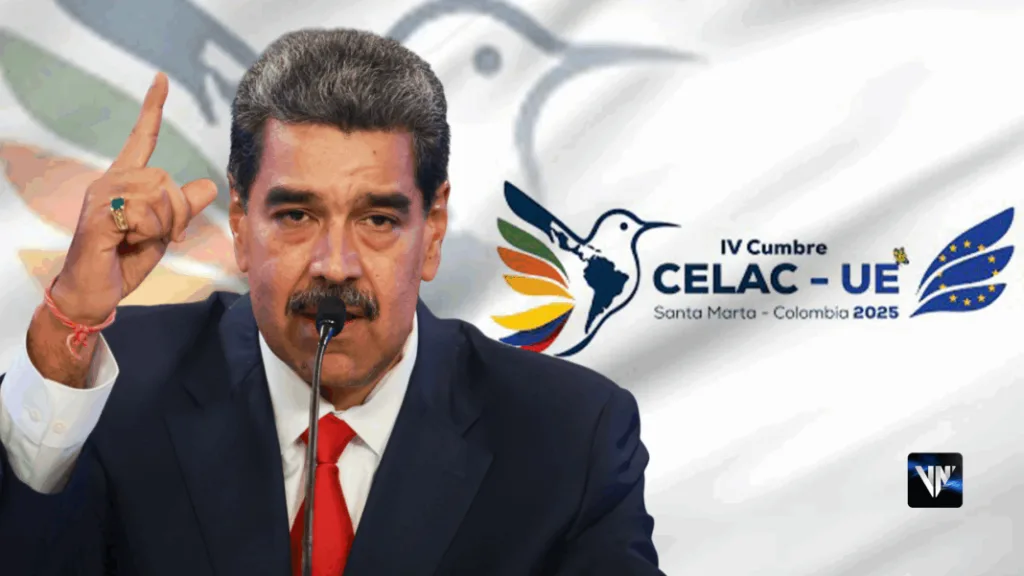
Photo composition showing Venezuelan President Nicolás Maduro with the logo of the CELAC-EU Summit in Santa Marta, Colombia. Photo: Venezuela News.

Orinoco Tribune – News and opinion pieces about Venezuela and beyond
From Venezuela and made by Venezuelan Chavistas

Photo composition showing Venezuelan President Nicolás Maduro with the logo of the CELAC-EU Summit in Santa Marta, Colombia. Photo: Venezuela News.
Venezuelan President Nicolás Maduro addressed a letter to the leaders of the Community of Latin American and Caribbean States (CELAC) meeting in Santa Marta, Colombia, calling for a unified continental response to the US military deployment in the Caribbean that has already caused nearly 70 civilian deaths at sea.
“The principle at stake today is clear and decisive: the sovereignty of states and the free self-determination of peoples. Venezuela declares this with absolute clarity: it does not accept and will not accept any tutelage. We do not accept that under euphemisms such as ‘security’ or the ‘war on drugs,’ the old Monroe Doctrine be imposed, seeking to turn our America into a stage for invasions and ‘regime change’ coups to steal our immense wealth and natural resources,” the Venezuelan president wrote in the letter.
Addressing those gathered at the site where Simón Bolívar delivered his last proclamation in 1830, Maduro drew a historical parallel between the Spanish reconquest expedition of 1815—commanded by Pablo Morillo with 10,000 men and 60 ships—and the current deployment of aircraft carriers, missile destroyers, and nuclear submarines in Caribbean waters.
“The forms of siege have changed, but not its essence,” President Maduro noted, linking the two episodes separated by two centuries. The letter, dated November 9, 2024, articulates a direct critique of US military strikes that UN experts and the Office of the High Commissioner for Human Rights have described as extrajudicial executions.
UN Security Council
President Maduro pointed out that these allegations were presented before the United Nations Security Council, where, according to the president, the United States acknowledged its crimes. The seriousness of the accusations contrasts sharply with the official justification of these operations under the pretext of security and the fight against drug trafficking.
Maduro condemned what he considers a resurgence of the Monroe Doctrine, formulated in 1823, which proclaimed US hegemony over the American continent. In response, he proposed elevating the “Bolivarian Doctrine” as the guiding principle of regional independence.
The letter recalled fragments of the Jamaica Letter of 1815, in which Simón Bolívar defined Latin American identity as “an intermediate species between the legitimate owners of the land and the Spanish usurpers,” emphasizing the mestizo condition as the foundation of sovereignty.
CELAC as an instrument of autonomy
The Venezuelan president recalled that CELAC was founded in Caracas in December 2011, with the participation of 33 heads of state, as a regional alternative that excludes the United States and Canada. He quoted former president Hugo Chávez, who proclaimed at the time that “only unity will make us free.”
President Maduro’s letter makes four specific demands: to reiterate the proclamation of Latin America and the Caribbean as a Zone of Peace, to categorically repudiate the militarization of the Caribbean, to demand an independent investigation of the US extrajudicial executions, and to establish regional mechanisms for humanitarian cooperation and collective defense.
President Maduro reiterated his condemnation of the blockade against Cuba, calling it “criminal and inhumane,” and condemned the island’s inclusion on the US list of countries that allegedly sponsor terrorism. He extended his criticism to the European Union’s sanctions, arguing that they result in the violation of fundamental rights via individual measures.
Call on CELAC to condemn the militarization of the Caribbean
The letter invokes three foundational moments of Bolivarian thought: the Jamaica Letter (1815), the Congress of Angostura (1819), and the Amphictyonic Congress of Panama (1826), the latter hindered by US imperial interests.
“Let us not allow the pettiness of external powers or the ambition of some oligarchies to divide us,” Maduro wrote, calling for the summit to transcend “the ritual exercise” and become “an act of firmness.”
CELAC-EU summit
With a call to revitalize biregional dialogue amid a complex political climate, the fourth summit between the CELAC and the EU opened in Colombia on Sunday. The meeting, held at the Santa Marta Convention Center, aims to strengthen strategic cooperation between the two blocs and establish a common roadmap for the next two years.
US Aircraft Carrier Rumored to Intend to Attack Venezuela in Operational Pause
Despite the absence of some heads of state and the political tensions spreading through the region, the summit is taking place with the participation of over 60 delegations, reflecting the shared interest in keeping channels of dialogue and cooperation open.
The central focus of the meeting revolves around energy, digital, and environmental transition, with an agenda aimed at addressing global challenges such as climate change, the technological gap, and sustainable productive transformation.
International relations experts said President Maduro did not attend the summit due to security concerns, noting that the US government’s military and intelligence agencies have a strong presence in Colombia. The experts also cited the US government’s announcement of a $50 million bounty for the Venezuelan president last August. In his place, Venezuela’s Foreign Minister Yván Gil joined the summit on Sunday afternoon.
(Telesur) with Orinoco Tribune content
Translation: Orinoco Tribune
OT/JRE/SF
Support Groundbreaking Anti-Imperialist Journalism: Stand with Orinoco Tribune!
For 7 years, we’ve delivered unwavering truth from the Global South frontline – no corporate filters, no hidden agenda.
Last year’s impact:
• More than 200K active users demanding bold perspectives
• 216 original pieces published in 2025 alone
Fuel our truth-telling: Every contribution strengthens independent media that actually challenges imperialism.
Be the difference: DONATE now to keep radical journalism alive!